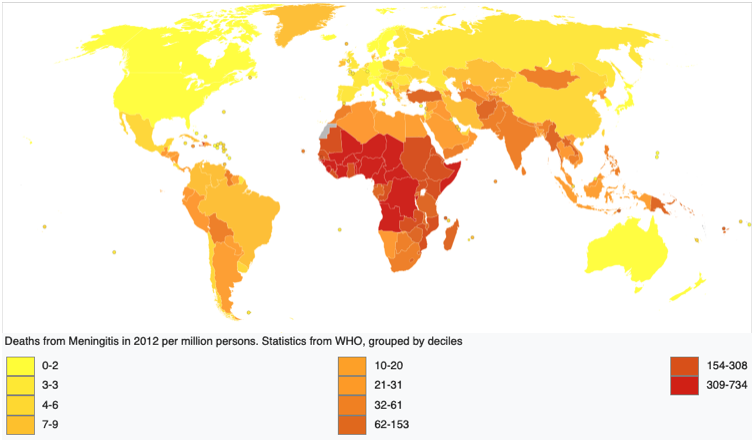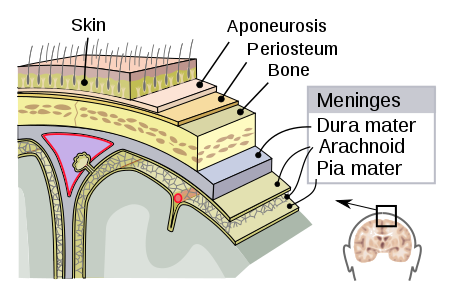 Abraham Lincoln
If given the truth, the people can be depended upon to meet any national crisis...
Abraham Lincoln
If given the truth, the people can be depended upon to meet any national crisis...
 Guildford news...
for Guildford people, brought to you by Guildford reporters - Guildford's own news service
Guildford news...
for Guildford people, brought to you by Guildford reporters - Guildford's own news service
University of Surrey Medical Research Helped Halve Global Meningitis Death Rate
Published on: 20 May, 2019
Updated on: 21 May, 2019

Johnjoe McFadden
Research by University of Surrey molecular geneticist Professor Johnjoe McFadden which led to the development of a rapid diagnosis test for meningitis has been named as one of the UK’s most pioneering health breakthroughs.
The Nation’s Lifesavers list, compiled by Universities UK, is part of the Made at Uni campaign celebrating the breakthroughs made by UK universities that have had the most significant impact on people’s everyday lives.
Professor McFadden developed a revolutionary new blood test for rapid diagnosis of meningococcal meningitis and septicaemia in 1996. The test, based on the polymerase chain reaction (PCR), has gone on to have life-saving impacts around the world.

Meningitis Deaths Worldwide – Source WHO/Wikipedia
Meningococcal meningitis is a life-threatening disease affecting 1.2 million people every year. Saving lives depends on accurate and rapid diagnosis. Doctors are trained to administer antibiotics immediately they suspect meningococcal meningitis.
While right for treating patients because they kill bacteria, antibiotics also prevent diagnosis using traditional tests for meningitis. As doctors are understandably nervous about giving drugs to patients before they know exactly what’s wrong, some patients were not getting the right treatment quickly enough.
The test that Professor McFadden’s group pioneered could be used to obtain an accurate diagnosis, even after patients were treated with antibiotics. The test is now routinely used for diagnosis of meningococcal disease worldwide. In the UK alone, 16,000 of these tests are performed each year, leading to rapid diagnosis and treatment of 1,000 patients.
The test was also critical in developing effective, life-saving vaccination campaigns. Altogether this test contributed to halving the worldwide meningitis death rate.

Meningitis is inflammation of the meninges, a thin lining of the brain and spinal cord.
Professor David Sampson, the university’s vice-provost, Research and Innovation, said: “Professor Johnjoe McFadden’s work wasn’t just a tweak of existing diagnostic methods, it was a revolutionary new technique. His polymerase chain reaction research was capable of being swiftly developed into tests that could quickly and simply diagnose meningitis.
Without this work, many thousands of meningitis patients may have been diagnosed too late to receive effective treatment, with fatal consequences. We are extremely proud of Professor McFadden’s contribution to medical science, and of his inclusion in this list of the UK’s greatest health science breakthroughs.
“His contribution epitomises Surrey’s tradition of performing research that makes a difference in the real world.”
Professor Dame Janet Beer, President Universities UK, said: “When people think of lifesavers they tend to focus on the dedication and skill of our doctors, nurses, carers, and paramedics, many of whom are trained at universities. Every day, up and down the country, universities are also working on innovations to transform and save lives.
“Research in universities is finding solutions to so many of the health and wellbeing issues we care about and the causes that matter.
“By proudly working in partnership with charities, the NHS and healthcare organisations, universities are responsible for some of our biggest health breakthroughs and in revolutionising the delivery of care.
“This campaign is a chance to bring to life the wonderful and often unexpected work going on every day in our universities and to celebrate some of the people working to make a life-changing difference to the nation.”
Since the pioneering work by Professor McFadden and his team, PCR-based tests have been developed to detect and monitor a wider variety of pathogens. This University of Surrey research continues to contribute to health and well-being on a global scale.
The full Nation’s Lifesavers list includes nominations fighting diseases, helping new parents and children enjoy the best start in life, supporting older people and improving our mental health and wellbeing. The selection reveals the amazing use of technology, such as drones to fight malaria, a smart glove for communicating sign language and robots helping older people.

See Dragon story: GBC’s Explanation of Major Land Sale Notice Error ‘Borders on Arrogant’ Says Councillor







Recent Articles
- Postal Vote Advice
- Hotel Granted Permission for 27-bedroom Extension
- Latest Figures Show Two in Every Three Burglaries Went Unattended in Surrey
- Dragon Interview: The Thriller Writer Who is a Climate Change Ambassador
- Notice: Guildford Twinning Association Filmfest 2024
- Zero Re-opens Uptown
- Letter: I Hope the New CEO Will Reflect on the Constructive Advice
- Campaign to Encourage Visitors to the Surrey Hills To Go by Train
- Police Commissioner Office Ordered to Remove Social Media Messages
- Police and Crime Commissioner Candidate Interview – Kate Chinn


Search in Site
Media Gallery
Dragon Interview: Local Artist Leaves Her Mark At One of England’s Most Historic Buildings
January 21, 2023 / No Comment / Read MoreDragon Interview: Lib Dem Planning Chair: ‘Current Policy Doesn’t Work for Local People’
January 19, 2023 / No Comment / Read MoreA3 Tunnel in Guildford ‘Necessary’ for New Homes, Says Guildford’s MP
January 10, 2023 / No Comment / Read More‘Madness’ for London Road Scheme to Go Ahead Against ‘Huge Opposition’, Says SCC Leader
January 6, 2023 / No Comment / Read MoreCouncillor’s Son Starts Campaign for More Consultation on North Street Plan
December 30, 2022 / No Comment / Read MoreCounty Council Climbs Down Over London Road Works – Further ‘Engagement’ Period Announced
December 14, 2022 / No Comment / Read MoreDragon Interview: GBC Reaction to the Government’s Expected Decision to Relax Housing Targets
December 7, 2022 / No Comment / Read MoreHow Can Our Town Centre Businesses Recover? Watch the Shop Front Debate
May 18, 2020 / No Comment / Read More






Recent Comments